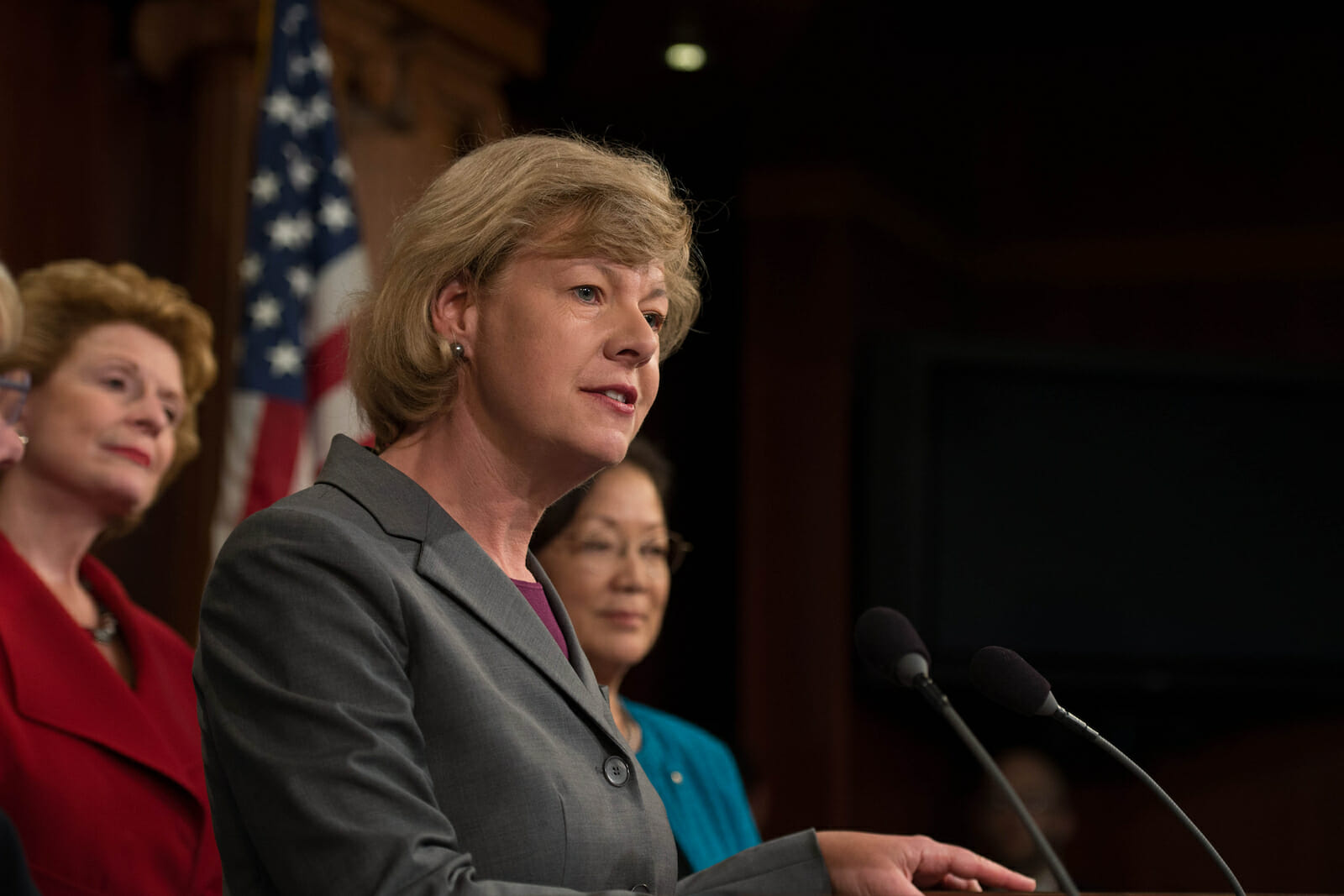
Politics
Female Candidates in the U.S. are Turning a Political Weapon on its Owners
“I remember what it was like to come home from school and not be able to get into the house. I’d pound on the door, but my mother wouldn’t answer. She would be passed out inside. My Mother had a drug abuse problem.” In her campaign ad, Democratic Senator Tammy Baldwin (D-WI) utters these words, staring firmly and decidedly into the camera lens. “I had to grow up fast. Very fast,” she adds.
Speaking candidly about a family member’s prescription drug addiction may not be the first thing you would expect from a political campaign video. But Tammy Baldwin, like many women running in the 2018 elections in November, is divulging details about her personal life in a way that political candidates have traditionally avoided.
2018 will go down as a historic year for women in US politics. A record-breaking 527 women registered with the FEC as congressional candidates, up 67% over 2016 figures. But beyond the numbers, it will go down as a turning point for the way female candidates approach their campaigns.
In 2017, Alejandra Campoverdi ran for Congress in a special election in California’s 34th District. Despite holding a master’s degree in public policy, and an impressive resume, which included several roles in the White House under President Obama, her Republican opponents sought to undermine her message by repeatedly advertising the fact that she once did a modelling photo shoot for Maxim magazine. The photoshoot in question had occurred 15-years prior to her campaign to run for office, but that didn’t matter. It was simply another weapon for her political enemies to bludgeon her with.
Women’s personal lives have traditionally been kept under wraps during political campaigns. When they have surfaced and become topics of open debate, it has almost universally been, as in the case of Campoverdi, due to the efforts of the opposition. A woman’s personal life has traditionally been used as a destructive tool to harm a candidate’s image, wielded as a political scalpel to slice up her message and cut away the public’s perception of her as a valid and viable candidate fit to hold office.
Nobody has appeared to enjoy wallowing in this lowly type of political skulduggery more than Donald Trump. On the presidential campaign trail in 2016, he wasted no time in launching vicious personal attacks aimed at belittling Hillary Clinton and her political message.
One of Trump’s barbs was a tweet which read: “If Hillary Clinton can’t satisfy her husband what makes her think she can satisfy America?” On another occasion, during a rally in Manheim Pennsylvania, he gleefully announced to the audience in attendance, “I don’t even think she’s loyal to Bill if you want to know the truth.” In the wake of recent events, the statement almost appears laughable. Trump’s own marital infidelity has played out in the media, but at the time, Trump was using Clinton’s personal life to cast a shadow of doubt over her presidential abilities.
But in 2018, women political candidates are increasingly casting the spotlight on their private lives themselves. Sol Flores, a Democratic candidate running in Illinois, recounted her experience of being sexually abused as a young girl. Stacy Abrams, a Democratic gubernatorial candidate in the state of Georgia, opened up about her financial problems. She explained how student loans and her brother’s drug addiction led to her racking up a $200,000 debt.
It is not just Democrats who are laying their personal lives bare. Women on both sides of the political aisle have offered insights into their personal lives. Republican Martha McSally, running for Senate in Arizona, gave an intimate interview to the Wall Street Journal in which she spoke honestly about the sexual abuse she suffered at the hands of her high school coach.
By putting their personal lives into the public sphere, the women are turning the weapon on their attackers. For the first time, female candidates are running as women, not in spite of being a woman. Rather than making their personal life a weakness to be hidden away, they are turning it into an asset to show grit, determination, honesty, and life experience.
In her campaign ad, Tammy Baldwin cites her mother’s drug addiction as a reason why she is so committed to tackling Wisconsin’s opioid crisis. Sol Flores vows to channel the same determination she had in fighting her abuser into fighting for the people of Illinois in Congress. Linking their personal struggles to their stance on a specific policy or using them as evidence that they possess the necessary character traits to excel in Congress, resonates with voters.
Hillary Clinton’s campaign stuck to the traditional political rules. She was calculated and cautious in her speeches, which led to criticisms of inauthenticity from both Democrats and Republicans. Her policies were dismissed as a political gambit rather than genuine heartfelt conviction.
Hillary conducted her presidential campaign in the same way as her male predecessors, keeping her personal life out of the limelight and keeping the focus squarely on her politics. However, research is showing that this approach does not work for female candidates.
The Barbara Lee Family Foundation is a group dedicated to advancing female representation in American politics. In Spring 2017, the group researched the way the American public responds to female candidates and their election campaigns.
The group’s research found that voters often had concerns about women candidates’ abilities to balance their professional and personal lives and that while men were able to effectively recover from criticisms about their personal lives, women candidates were much less likely to recover from the same criticisms.
The foundation concluded that for women candidates, opening up about their personal lives was essential in alleviating these voter concerns. Describing their personal support networks, showing examples of the candidate having a healthy work-life balance, and drawing on personal life experiences when talking about voter issues helped show voters that they were prepared for the rigours of holding office. It reassured them of the candidates’ abilities as an elected representative.
The general public does not have the right to demand information about candidates’ personal lives. But by voluntarily offering it up, women candidates are showing honesty and transparency at a time when both are lacking in the US political system, and particularly, the Oval Office.
American politics needs talented and inspirational women. 2018 will not bring the curtain down on personal attacks against women in politics. However, it is shaping up to become a seminal moment. Female candidates are taking control over the divulgence of their personal lives and harnessing the political power that comes with it.

